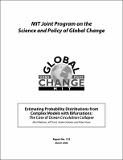| dc.contributor.author | Webster, Mort David. | |
| dc.contributor.author | Scott, Jeffery. | |
| dc.contributor.author | Sokolov, Andrei P. | |
| dc.contributor.author | Stone, Peter H. | |
| dc.date.accessioned | 2006-04-28T19:02:04Z | |
| dc.date.available | 2006-04-28T19:02:04Z | |
| dc.date.issued | 2006-03 | |
| dc.identifier.uri | http://mit.edu/globalchange/www/abstracts.html#a133 | |
| dc.identifier.uri | http://hdl.handle.net/1721.1/32540 | |
| dc.description | Abstract in HTML and technical report in PDF available on the Massachusetts Institute of Technology Joint Program on the Science and Policy of Global Change website (http://mit.edu/globalchange/www/). | en |
| dc.description.abstract | Studying the uncertainty in computationally expensive models has required the development of specialized methods, including alternative sampling techniques and response surface approaches. However, existing techniques for response surface development break down when the model being studied exhibits discontinuities or bifurcations. One uncertain variable that exhibits this behavior is the thermohaline circulation (THC) as modeled in three-dimensional general circulation models. This is a critical uncertainty for climate change policy studies. We investigate the development of a response surface for studying uncertainty in THC using the Deterministic Equivalent Modeling Method, a stochastic technique using expansions in orthogonal polynomials. We show that this approach is unable to reasonably approximate the model response. We demonstrate an alternative representation that accurately simulates the model’s response, using a basis function with properties similar to the model’s response over the uncertain parameter space. This indicates useful directions for future methodological improvements. | en |
| dc.description.sponsorship | This research was supported in part by the Methods and Models for Integrated Assessments Program of the National Science Foundation, Grant ATM-9909139, by the Office of Science (BER), U.S. Department of Energy, Grant Nos. DE-FG02-02ER63468 and DE-FG02-93ER61677, and by the MIT Joint Program on the Science and Policy of Global Change (JPSPGC). | en |
| dc.format.extent | 452835 bytes | |
| dc.format.mimetype | application/pdf | |
| dc.language.iso | en_US | en |
| dc.publisher | MIT Joint Program on the Science and Policy of Global Change | en |
| dc.relation.ispartofseries | Report no. 133 | en |
| dc.title | Estimating Probability Distributions from Complex Models with Bifurcations: The Case of Ocean Circulation Collapse | en |
| dc.type | Technical Report | en |
| dc.identifier.citation | Report no. 133 | en |
